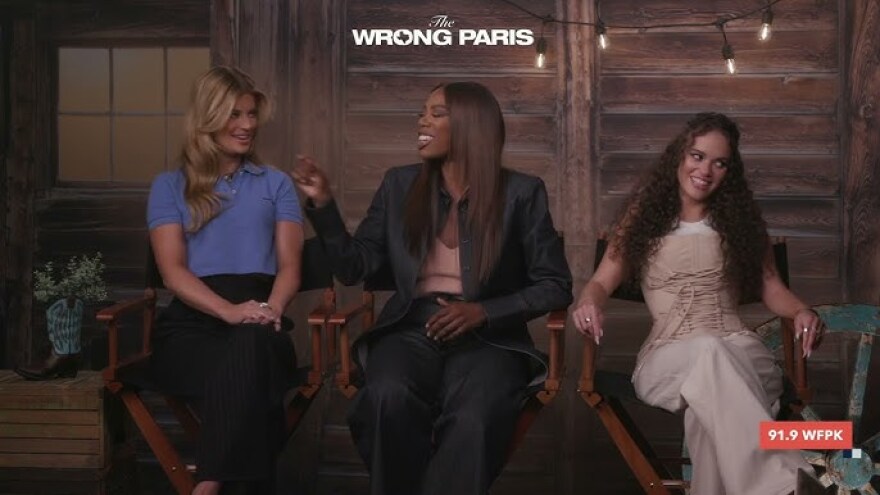By the time we’ve rolled through the intro and exchanged hellos, I’ve already lost control of the room.
“Is Consequence spelled with a K?” Yvonne Orji asks, spotting the logo behind me.
“With a C,” I say.
“Dang it, you missed it. You had Kyle right there. Kept Up With Kyle. We’ll trademark it and sell it back to you for a million.”
So that’s the tone: I arrive to interview three actors about a Netflix rom-com called The Wrong Paris and immediately end up in a development meeting for my fake future media empire.
The movie follows a young woman (Miranda Cosgrove) who signs up for a dating show thinking she’s headed to Paris, France and instead lands in Paris, Texas. She decides to tank her chances and get eliminated, right up until actual feelings for the Bachelor mess with the plan. Around her: a cast of gloriously extra contestants and one very charismatic host.
That host is played by Orji, who already lives in reality land in real life, having hosted My Mom, Your Dad and Pop the Balloon. “I always go in full hearts and open eyes,” she says. “I really want people to find love. And then I’m learning that embedded in most reality, there is an inherent messy or chaos. That’s not how I live my life.”
She laughs. “I go in full of hope and then I’m like, wait—what’s this? What’s going on? People being people.”
Her character in The Wrong Paris starts out more machine than romantic, but Orji insists Rachel’s arc matches the way she actually approaches these shows. “How Rachel ends the movie is literally how I enter all of these shows,” she says. “I want hope, I want love, I want joy, I want a win at the end. So it felt good to get that redemption song.”
If Orji is the ringmaster, Madison Pettis and Hannah Stocking are two of the chaos engines. Both play contestants cranked just a little past normal human settings—or, depending on your experience with dating shows, maybe not cranked at all.
“You all have your own version of crazy,” I say, like an idiot.
Pettis jumps in with some damage control. Stocking just grins.
“You could call it crazy,” she says, “or authentic glee, myself.”
Stocking’s character, Eve, operates at permanent red alert. “I’m not normally exuding ovulation,” she jokes, “but I love hard. I love-bomb a lot in real life. And maybe I’ll stalk a little bit—just a little light. Miller Lite stalking.”
They were smart enough to let her off the leash. “They let me improv a bunch,” she says. “I had so much fun, laying in bed every night thinking of horny one-liners. ‘Not horny, ovulating,’” she corrects herself, then gives up. “Okay, horny.”
Pettis, meanwhile, had to figure out how far to push her own brand of extra. “I did one audition with a normal accent and one with a Southern accent,” she says. “They weren’t sure yet.” The Southern one hit differently. “There’s a bless-your-heart-ness to her. Somehow the things you’re saying are so mean, but with the sweet little accent, you’re like, I think she was just nice to me? I don’t know what just happened.”
At the table read in Vancouver, the director told her to go “100 percent, full throttle” with the voice. “That set the tone. That immediately made me click into it.”
Everyone on the call knows what “bless your heart” really means. “It’s code for ‘I’ll stab you in your sleep,’” Orji says. “I hate you with all my heart.”
The three of them are also very aware that “crazy” gets tossed at women as a catch-all insult.
“When men call women crazy, that’s just the default,” Orji says. “No, she’s eclectic. She’s a woman that knows what she wants and can say it. When men say crazy as a default, we just need to use our words better.”
I backpedal and rephrase: driven, ambitious, willing to do anything. They let me live.
That idea of “anything” is also baked into how they build characters. Orji compares it to songwriting—at first you’re mostly emulating, then you eventually find your own voice. “If I can see my lines and they feel natural coming out of my mouth,” she says, “like I know her or a version of her, I can tap into this person. Then I’m like, ‘Easy money sniper, baby.’”
If not, it becomes: can I see myself in her, or is she here to teach me something about myself?
Stocking goes even more direct. “I keep many different types of people as friends,” she says. “I have a friend that’s exactly like Eve. When I first read it I was like, ‘Oh, it’s her.’ And I just kind of embodied that persona.”
Does the friend know she’s been immortalized? “No,” Stocking says, then smirks. “I hope she comes to the premiere.”
Pettis, for her part, brought receipts from real Texas. She grew up in Arlington, which gives her a built-in authority on the Paris, Texas of it all—even if the movie shot in Vancouver. “Those mountains were stunning,” she says. “Texas is the flattest state on earth. They’re like, ‘We’re gonna remove those in post.’ Movie magic.”
She gives the cast credit for not turning the South into cartoon cosplay. “You can go really stereotypical with it and it’s not authentic,” she says. “Everyone’s accents were really good.”
Orji gets the last word on the reality question: can real love actually come out of a setup like this?
“I think some people come in with good intentions,” she says. “And then they fall into what sells, what the machine needs for it to be a success.” Others refuse to play along and skip reality TV altogether. Then there are the ones who lean all the way in. “‘This is it, this is it, this is it, I’m going all the way in, baby.’”
She shrugs, half amused, half resigned. “People say the same thing about comedians: we’ve all got deep drama or trauma. And… yeah. I agree. As a comedian.”
The movie might be called The Wrong Paris, but spending 14 minutes with these three, you start to think: this is exactly the right amount of drive for a dating show set in Texas.
Watch the full interview above and then check out the trailer below.






